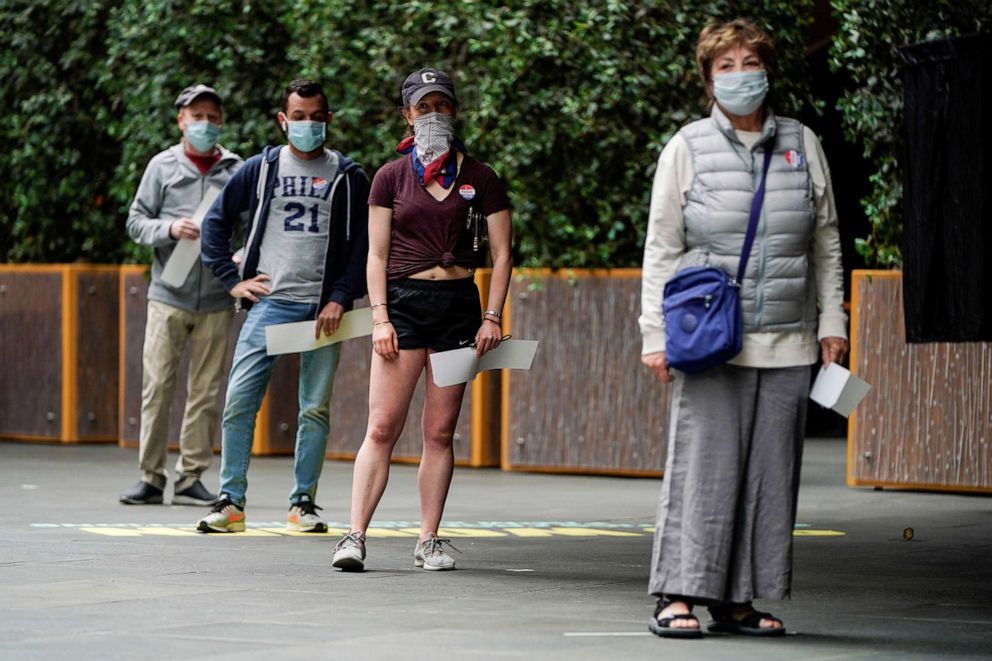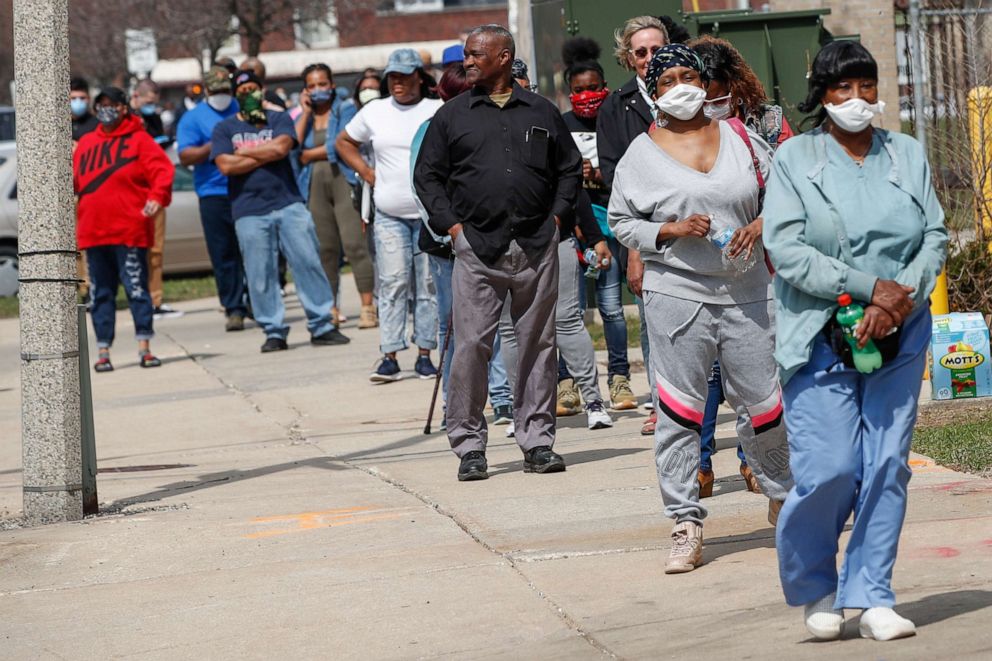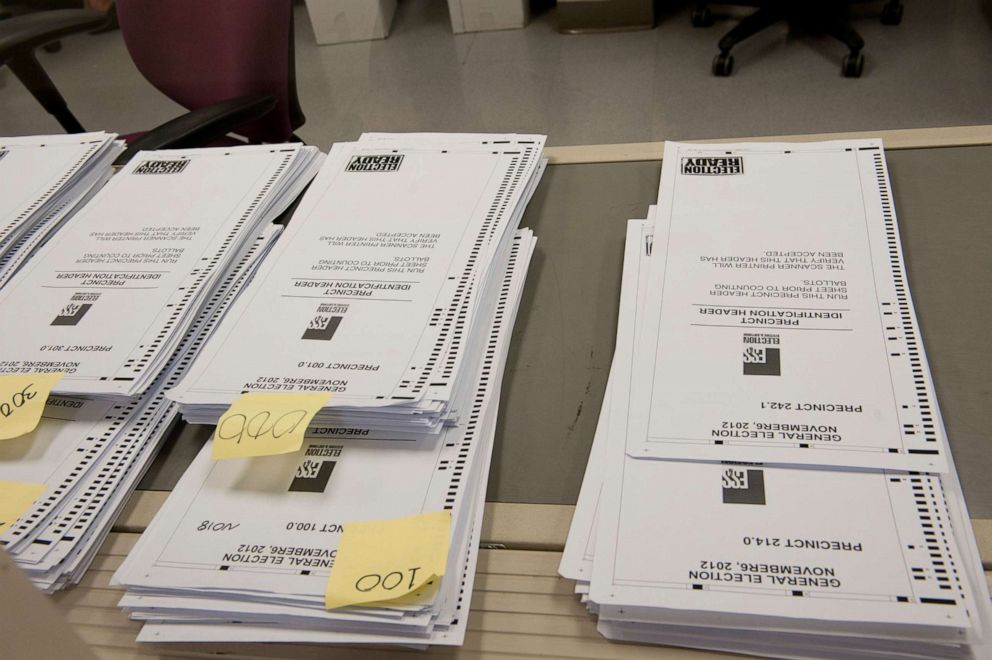'This is not just a Georgia problem': Primary election troubles foreshadow challenges for November
The election fallout in Georgia follows a familiar fate in other states.
The election fallout in Georgia, compounded by hours-long lines, problems with voting equipment, poll worker shortages and a host of other issues, follows a familiar fate of states where elections have plunged into chaos in the age of coronavirus -- foreshadowing graver challenges awaiting in the fall.
"No state should look like Georgia did today," Stacey Abrams, a prominent Georgia Democrat who unsuccessfully ran for governor in 2018, said toward the end of a long day of in-person voting on Tuesday. But voters in states that have already held primaries since the onset of the coronavirus crisis -- such as Wisconsin, Pennsylvania and Ohio -- faced similar failures and unsettling scenes.
"What we're seeing so far is that, yes, most people are able to vote, that's the good news. But we are seeing these hotspots, if you will," said Michael McDonald, an expert on elections and a political science professor at the University of Florida. "They're not just sporadic, they're more widespread."
"If the system is overwhelmed now," McDonald said, when turnout is likely to be about half or a third of the expected turnout for the general election, "that does not bode well for November."
Leading into Tuesday, Georgia's number two state election official, Jordan Fuchs, called the primary "a successful election" in an interview with ABC News, pointing to the "massive amount of turnout in the middle of a pandemic" after more than a million voters cast their ballots absentee -- marking a more than 2,500% increase in returned absentee ballots this year.
But in the first few hours of voting, the best-laid preparations were quickly dismantled, as deficits in staffing, delayed poll openings, outstanding requests for absentee ballots and reports of missing or malfunctioning new voting equipment led to long lines, with voters reporting waiting for up to three hours.

"It was a mess," said Bianca Keaton, the chair of the Gwinnett County Democratic Party, of Tuesday's election. Her phone started "going off" as soon as polls opened, she told ABC News, with messages that "doors were closed, lights were off, there was no one there" at polling locations across Gwinnett County, the second-most populous county in the state that covers the northeastern suburbs of Atlanta.
Keaton, who voted absentee in the election due to the coronavirus, described the issues in Gwinnett as not "as dire" as Fulton and DeKalb counties, where a large portion of the problems were being reported. But, she said, "It definitely impacted a lot of our Democratic precincts." Fulton is home to most of Atlanta and DeKalb covers the suburbs of the city to the east.
But delays are not new to counties with significant minority populations. Long wait times, according to a new report from the Brennan Center, disproportionately impacted minorities across the country in the 2018 midterm elections, with black voters waiting on average 45% longer than white voters, and Latino voters 46% longer.
The messy primary day in a red-leaning battleground state led to finger-pointing, with both parties trading blame. The state GOP criticized "incompetence" at the county level while the state Democratic Party put the blame squarely on Secretary of State Brad Raffensperger, a Republican.
Raffensperger, in turn, faulted local officials in only Fulton and DeKalb counties, saying there were few issues elsewhere in the state. But by the time polls closed at 7 p.m., 20 counties had extended polling hours to compensate for the delays throughout the day. In at least 41 precincts across Fulton, Cobb and DeKalb counties, voters and volunteers reported issues with machines being down, shortages of provisional ballot and delayed openings, according to Fair Fight Action, the voting rights advocacy organization founded by Abrams.
"The best intentions met the worst preparations, and we found ourselves in the midst of both incompetence and malfeasance," Abrams said at a press conference late Tuesday night.

Raffensperger announced late Tuesday that he is opening an investigation into the Fulton and DeKalb counties' election processes.
"The voting situation today in certain precincts in Fulton and Dekalb counties is unacceptable," he said. "My office has opened an investigation to determine what these counties need to do to resolve these issues before November’s election. Obviously, the first time a new voting system is used there is going to be a learning curve, and voting in a pandemic only increased these difficulties. But every other county faced these same issues and were significantly better prepared to respond so that voters had every opportunity to vote."
But Georgia, which is one of the largest states to struggle with running an election during a pandemic, is not the first state to become overwhelmed by the rapid changes to election blueprints. It is only the latest state to wrestle with the challenges -- although it did have the most time to prepare -- offering an unnerving preview of a potential November election if the virus persists.
In early April, Wisconsin, the first state to hold an election at the height of a lockdown, broke from the pack of states backloading the primary calendar -- seeming determined to stay on course to hold its chaotic spring election. But the undertaking to quickly shift to an expanded absentee voting apparatus proved to be too tall an order.
After a chaotic series of emergency orders and last-minute legal wrangling, Wisconsin's election unfolded against the backdrop of bitter partisan feuding and the coronavirus, with thousands of voters casting their ballots wearing masks and gloves and standing in long lines while keeping a safe distance of six feet from one another.
The delays were due in part to nearly 60% of Wisconsin municipalities reporting a shortage of election volunteers, and 111 jurisdictions reporting they could not staff even one polling place. Milwaukee, the state's largest city, only had five polling locations instead of the 180 that historically operate on election day.
Days after in-person voting, the problems were not over. State election officials were still grappling with two separate issues with absentee ballots: scores of missing ones that were never delivered were found at mailing centers, and guiding local clerks who were struggling to figure out which ballots to count after some absentee ballots were returned without postmarks the day after the election. Results from the contest weren't released until a week after the election.
Democratic National Committee Chair Tom Perez called the election, in the pivotal Midwestern state, "voter suppression on steroids." Four years ago, Donald Trump carried the Badger state, the first Republican to do so in over 30 years, by only about 23,000 votes, or less than one percentage point.
Wisconsin has become the first test case for other states that are seeking to navigate the uncharted terrain of running elections during a pandemic.
"One gift we were given is Wisconsin," South Dakota Secretary of State Steve Barnett, a Republican, told ABC News just before the state's June 2 primary. "They weren't able to model after anybody else -- we were all on the sidelines kind of watching them."

State election officials in Wisconsin are now aiming to minimize their mistakes for the general election. In a postmortem summary written by the state's elections commission, the officials examined the problems surrounding the spring election and outlined "lessons learned" for the coming months. Among the changes the commission noted is tracking absentee ballots throughout the vote-by-mail process through barcodes to avoid more missing ballots.
A few weeks before Wisconsin, Ohio was initially scheduled to hold its primary in mid-March. But due to eleventh-hour legal challenges and a unilateral decision by the state's health department, in-person voting was shut down and the election was postponed until three weeks after Wisconsin.
Even in the days leading up to the late April primary, the quick transition to an all-mail election hit some hiccups when delays with the Postal Service left some voters without an absentee ballot and no recourse to make sure their vote was counted.
While elections officials largely agreed with Republican Gov. Mike DeWine’s decision to shutter in-person polling sites during the outbreak, they worried that the state legislature’s tight timeline to administer an all-mail election was too lofty a goal.
"At this point, there's really nothing that can be done," Aaron Ockerman, the executive director of the Ohio Association of Election Officials told ABC News just days before the ballot deadline in April. "That's not a realistic timeframe. That's a statutory timeframe. But certainly as we look into the future, relief from that and giving voters more time to get their ballots into the board of elections, would be very, very helpful."
In other key swing states, such as Pennsylvania, which voted last week on June 2, significant efforts to expand vote-by-mail did not offset issues that emerged at in-person voting sites on election day.
Last Tuesday, in the state's largest city, Philadelphia, there was a 77% reduction in polling sites due to worker shortages and consolidations.
On the mail-in voting front, due to a 17-fold increase in absentee ballots, and the deadline for receiving ballots landing on Tuesday, votes are still being counted more than week after the primary.
It still isn't clear how much the coronavirus will impact elections in the fall, but in a state like Pennsylvania, where Trump’s margin of victory over Hillary Clinton was just 44,292 votes, delayed race calls in primaries amplify concerns that the outcome of the Nov. 3 election might not be known for days, as election officials continue to process ballots.
"This surge is one thing, but I think we could expect a lot more than this in November," Secretary of State Kathy Boockvar said on night of Pennsylvania's primary. "Even without COVID-19 people now, you know, have a head start on knowing this exists and to have this amount of volume, and participation and engagement is likely we'll likely see that again."
The implications are even more worrisome with the president continuing to cast doubt over the integrity of vote-by-mail, calling it "corrupt" and arguing -- without evidence -- that it is ripe for fraud. Experts tell ABC News that there is no widespread fraud with mail voting.
"I don't know what's going to happen in November, I hope that most people will be able to navigate the mail system, and cast a mail ballot, and we're going to learn from our mistakes through these primary elections and be better prepared for November," McDonald said. "That's my hope...[but] I think we should prepare ourselves for the fact that there are going to be some failures in November, and my other hope or prayer here is going to be that the election is decisive enough that whatever problems that we have in November, are not going to be consequential to the outcome of the election."
But some longtime Democratic strategists' concerns for November are more acute after Georgia.
"I'm very concerned about our country's preparations for the election," Guy Cecil, chairman of Priorities USA, the largest Democratic-aligned outside group, said during a press briefing with reporters on Wednesday, the day after the election. "This is not just a Georgia problem, it's not just a southern problem. This has been happening in states all across the country."
ABC News' Quinn Scanlan and Meg Cunningham contributed to this report.
This report was featured in the Thursday, June 11, 2020, episode of “Start Here,” ABC News’ daily news podcast.
"Start Here" offers a straightforward look at the day's top stories in 20 minutes. Listen for free every weekday on Apple Podcasts, Google Podcasts, Spotify, the ABC News app or wherever you get your podcasts.




